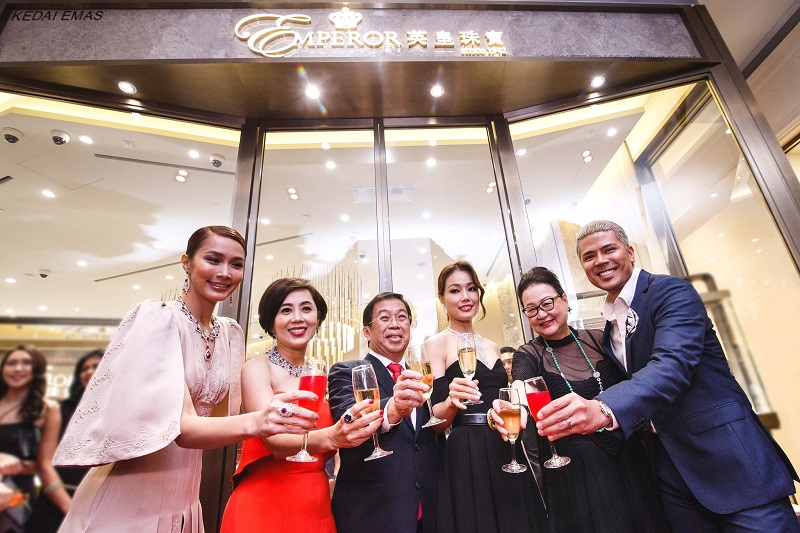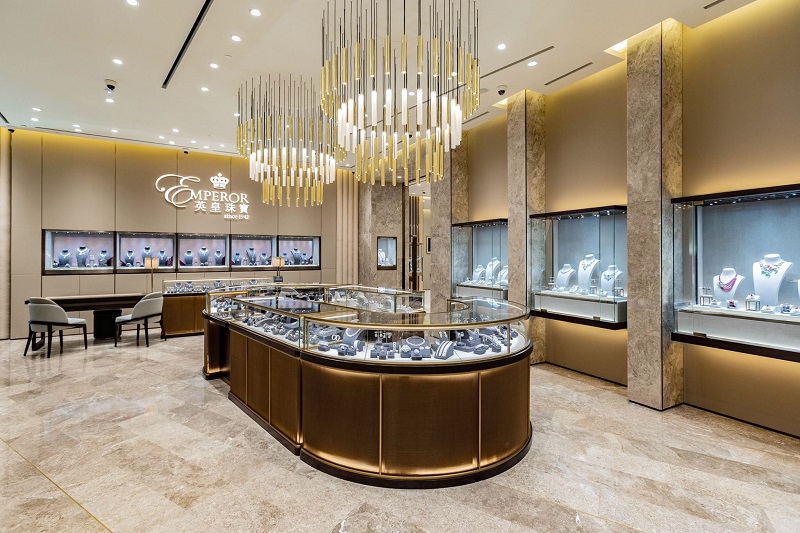
CEO Cindy Yeung has transformed the public-listed company from a traditional brand to one that epitomises “fine jewellery” and luxury (Photo: Haris Hassan/The Edge)
In 1942, Emperor Group established its initial presence on one of Hong Kong’s oldest thoroughfares, Shanghai Street, as Shing On Kee Watch Shop. By the time it rebranded as Emperor Watch and Jewellery and opened a third store in Jade Mansion at the junction of Nathan Road and Waterloo Road in 1965, second-generation heir Albert Yeung Sau-Shing had begun to make his mark on the island, eventually earning the moniker, “King of clocks and watches”.
Now group chairman, he is one of Hong Kong’s top billionaires whose reputation rests on his having built a multi-industry empire covering property to entertainment, all under the Emperor name.
As for the business that started it all, Emperor Watch and Jewellery has grown from an established retailer with a legacy into one of Asia’s most prestigious jewellers. Credit for this is goes to CEO Cindy Yeung — his eldest daughter — who, in two decades at the helm, has transformed the public-listed company from a traditional brand to one that epitomises “fine jewellery” and luxury. In conjunction with the recent opening of Emperor Jewellery in Pavilion Kuala Lumpur, Options sat down for an exclusive interview with Yeung to find out more about the brand’s evolution.
Noticeably missing from the Malaysian store is the “watch” element. Contrary to the idea that this means a smaller, more tentative presence, it was Yeung who decided to first focus on introducing its jewellery lines here. With the watch brands that Emperor typically carries, such as Rolex, Cartier and Patek Philippe, having established retailers here, it may well be an ingenious move.
“We’ve been keeping an eye on the Malaysian market. From our various studies, we saw there are international brands around, but not a lot, and the local brands differ from our offerings as most of their products centre on gold and more traditional jewellery. We want to come in with an East-meets-West concept, with the emphasis on design and craftsmanship,” Yeung says.

Malaysians’ receptiveness to bigger and more bespoke pieces, as well as openness to colourful and unique designs has proven to be a right fit for her vision. “Perhaps it’s because of the culture, the weather and the fashion. You have a multiracial demographic here and I can play more with design and colour. That is what I want to do. I would keep pure diamond collections to, say, 20% of our products.”
This strategy bodes well for Emperor standing out amid increasing competition in Asia-Pacific. She acknowledges that part of the challenge of steering an established brand is to bring something fresh and new to it and reach the younger market, who tend to shun expensive fine jewellery.
Yeung is familiar with that disinterest. He had groomed her for the family business from childhood, but she was rather indifferent about it as a youngster. “It’s something you take for granted. Going in and out of the shop every day, I didn’t pay much attention. I preferred fashion and art, other things.”
An anecdote she often shares is what sparked her love for fine jewellery. “When I was 21, I walked into our store one day and saw a diamond. Somehow, it really caught my eye, as if for the first time. It captivated me.”
After graduating with a degree in business administration, Yeung went on to obtain certification with the Gemological Institute of America (GIA). That would prove key to Emperor’s transformation. “On the jewellery side, most of our products used to be OEM (original equipment manufacturer), sourced from suppliers. I felt we needed to have our own designs, our own production and merchandising teams to bring in loose stones and create our own pieces. I was insistent. From the 1990s, we started working towards that, though of course, [we still had] the OEM items.”
Today, Emperor has several collections with original designs, among them Nuò by Cindy Yeung, which features higher-end pieces. These were brought into Malaysia and, according to in-store staff, more than 90% of these were snapped up before the official launch.

Yeung says with a modest smile: “The idea is that each of the collection’s pieces is made [according to] a higher standard, from the quality of the stones to the setting and craftsmanship and, of course, design. Also, there are limited quantities, and may not be stocked in every store. We have Nuò only in Beijing, Hong Kong, and now Malaysia. We may also make one-offs or modify an existing design to create variation.”
Emperor Jewellery’s other focus here is jade, a stone that may well give it an edge over other brands. A quick browse in-store reveals multiple jade jewellery designs, many of which are unlike the traditional styles Malaysians are used to seeing.
“We’ve made them into long necklaces and earrings. Even with the more traditional bangles, we’ve included diamonds and sapphires, setting them in creative patterns that will pair well with a modern qipao or contemporary fashion styles,” Yeung say.
With younger consumers being an important target for future growth, Emperor has put out affordable entry-level collections with more dynamic and fresh designs, such as YoYo and Heartbeat. That said, she believes the younger generation can be educated and sold on the idea of wearing jade — as happened with her 21 year-old daughter. “I asked her to try on a jade necklace one day and it worked. She liked it too. I realised the young can also wear jade well.”
The idea of sharing stories is something Yeung repeats in our conversation, one that has become part of Emperor Jewellery’s DNA and crucial in keeping ahead in the fast-moving industry. “If there’s something a little different about a product, if there’s a story, things become more interesting. That makes a difference. You are also buying a story and meaning; it is a unique experience.”
Yeung goes on to give an example: “When I meet younger couples or newlyweds, I always share my own story. When I gave birth to my daughter, I started buying one diamond per year and stored them. When she reaches her twenties, I can gift her with a diamond necklace. Yes, you can still buy her a necklace when she grows up, but it will be more expensive. There’s also the story and sentiment attached to one that has been carefully collected. Your daughter will appreciate it more.”

These insights could come from female intuition, a fact Yeung does not deny. Though the industry today has many more women leaders, it was not the case when she first joined the business in 1991, working her way up to the top.
“It was tough,” she acknowledges, citing the fact that she also had to juggle her roles of being wife — to film director Cheung Kin-Ting — and a mother of three. “I think putting myself into the shoes of our employees helps a lot, and how men and women have different perspectives. I learnt this when I spent a year working outside before joining the family business. It is about building a sincere relationship. In the end, many issues are centred on that: Is there a sense of belonging? Can they make a living? Does the company have a strong vision? If you can provide for them in these three areas, wouldn’t it be easier to build that relationship?”
Trust and sincerity are the same principles she upholds when dealing with customers. She shares the most valuable lesson her father has taught her. “Nuo is actually my middle name, which means promise. My father is someone who is very prompt with time and keeps his word. The idea is to think carefully before we promise anything. I have always kept that in mind.”
As for her children, Yeung is surprisingly relaxed about whether they should join the family business. “I would ask them to work outside for a few years — my one year was too short! Then, if they really want to join the business in any role, we can decide on that. Even if they don’t want to, it is okay, because ultimately they must have passion for what they do.”
Experience has taught her that an attitude of wanting to learn and having a wide worldview are important. “How do you bring change? The market then and now has changed tremendously — you cannot just look at jewellery alone. You have to look at fashion, see what Gucci is doing this year, what Valentino is up to, what is the latest in art and music. I went to Paris, Israel and India — which inspired one of my pieces — and looked at their local design aesthetics, how they set their stones and what elements are there. You cannot stand still.”
It is no wonder that Yeung is keeping an eye out for new opportunities in Malaysia and the region. On that note, she steps out onto the floor to present her customers a new chapter in Emperor Watch and Jewellery’s story.
Emperor Watch & Jewellery is located on the second floor of Pavilion KL. This article first appeared on Feb 4, 2019 in The Edge Malaysia.


